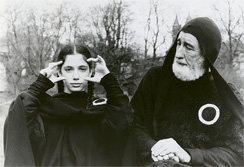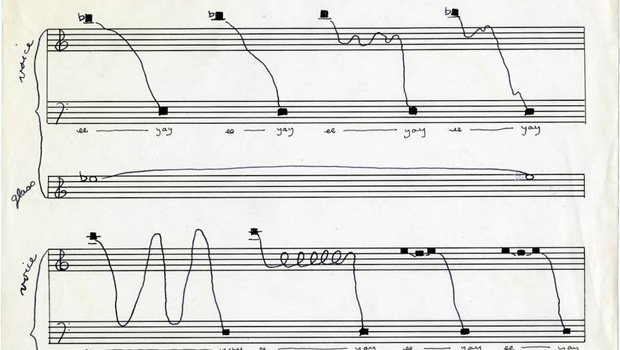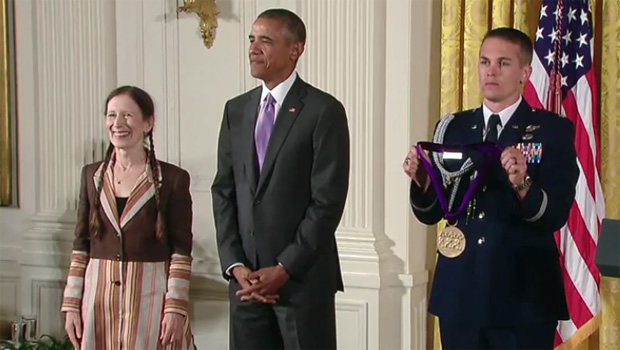The singular voice of Meredith Monk
President Obama had words of high praise for Meredith Monk this past week as he awarded her the National Medal of Arts. Not a bad honor for the woman with A SINGULAR VOICE who rarely uses any words in her performances. Martha Teichner has paid her a visit:
The braids are as identifiably Meredith Monk as the voice. Hearing her sing for the first time can be startling. Those sounds -- can the human voice actually make them? Those aren't words she's singing.
Hear an excerpt from "Travel Dream Song," from her 1991 opera, "Atlas," by clicking on the player below:
"One day, I just had a revelation that the voice could be an instrument," Monk said, "that it could move like my hand moves, that it could be like the spine, that it could jump, that it could turn, that it could fall ... that within it were all these feelings that we don't have words for."
Even people who think they don't know her work have heard her music, if they've seen the Coen Brother's "The Big Lebowski." It found its way onto the TV show, "So You Think You Can Dance," when Jessica Richens and Ricky Ubeda danced to Monk's "Vow," choreographed by Sonya Tayeh:
Pop-singer-songwriter Bjork is inspired by her. Since the 1960s, Monk has been on the edge -- subtly, subversively permeating the mainstream.
"It's just been a long-term kind of ever-rippling, outward rippling kind of influence," said Alex Ross, a music critic for The New Yorker. "I think she's tremendously important. She's one of the giants of our era. I mean, I feel lucky to be living in her period in this sense, because there's just no one else out there doing what she does."
What she doesn't do is fall into any one category. She sings, dances, choreographs, and composes. She also makes films.
"Newspapers and magazines have been mystified by whom to send -- which critic from which department to send to evaluate this work," said Ross.
Monk's background may, in part, explain her musical multi-tasking. Singing is in her DNA. Her mother sang commercials on the radio; her grandfather was an opera singer; her great-grandfather, a cantor in a Moscow synagogue.
She was born with a condition called strabismus, which meant that her eyes work independently of each other. So, to help with coordination, at the age of three, she was sent to study something called Dalcroze Eurhythmics, invented by a Swiss composer in the 19th century.
"He developed a series of exercises," she told Teichner, "and one thing that he said that was very beautiful was, 'All musical truth resides in the body.'"
"It sounds to me as if that statement is almost the cornerstone of everything you've done ever since," said Teichner.
"Exactly! You know, it's that idea that there's no separation between the voice and music and the body."
In college Monk studied voice, dance and composition. When she began writing songs, what ended up on the page looked more like an EKG than conventional musical notation, as she explored what the human voice was capable of.
"Within it was male and female," she said. "Within it was landscape. Within it was character. Within it was all kinds of ways of producing sound. And I felt that it was this profoundly ancient instrument."
Teichner asked, "Why not just write music with words that everybody understands?"
"Well, I think words limit everything," Monk replied. "I want people to experience something, and without writing words, I can actually make, I think, a more heart-to-heart experience."
Monk recently celebrated her 72nd birthday. She's won Guggenheim Fellowships, a so-called MacArthur "Genius Grant," and now, just this past week, the National Medal of Arts. She has just completed a year as composer in residence at Carnegie Hall -- all prestigious landmarks in a fifty-year career.
Alex Ross said, "Instinctively people think of her as a lost folk singer, who's emerged from the mists of whatever civilization, whatever culture, whatever period -- it's difficult to put your finger on it."
What better pet for such a person than a species 20 million years old? Meet Neutron, a box turtle Monk has had for 37 years. "This is about as primal as you can get," she said.
"I think I've always been interested in a timeless art, more a feeling about time as a cycle or a circle," she said.
One's first impression of the downtown Manhattan space where Monk has lived and worked since 1972 is, time doesn't exist. Never mind what's popular or commercial; here, she does what she's always done: peer inside herself.
"Did you ever care about getting famous, getting rich?" Teichner asked.
"My concern was really the work," Monk said. "I wanted to follow my own path in as honest a way as I could. And pretty much, that's what I have done."
Here, she just plays and plays until the music finds her.
For more info:


